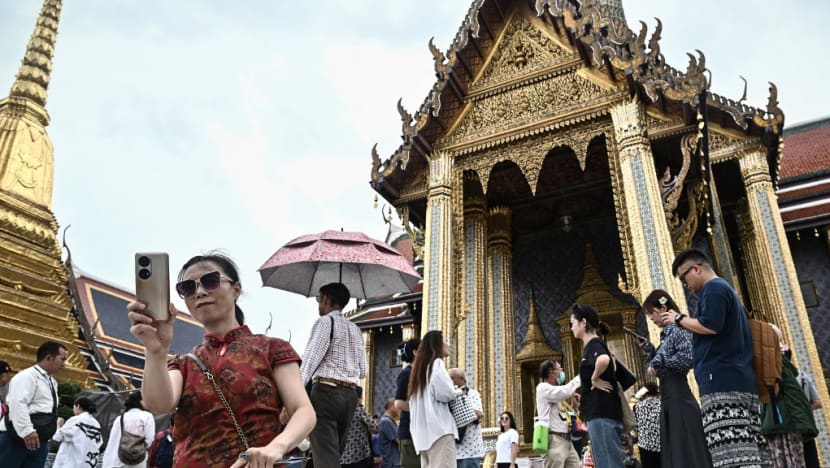Commentary: Thailand must restore confidence it is safe for residents and tourists alike
Is Thailand safe to visit after the recent Bangkok Siam Paragon shooting? The challenges of boosting tourism while addressing its social issues will be a test of leadership, says Thai scholar Prem Singh Gill.

This picture taken on Sep 10, 2023 shows tourists visiting the Grand Palace in Bangkok. (Photo: AFP/Lillian SUWANRUMPHA)
SINGAPORE: The recent Siam Paragon mall shooting has cast a shadow over Thailand’s hopes to boost its economy by wooing tourists. It amplified concerns about safety, refreshing memories of the 2015 bombing in Bangkok’s city centre, killing and injuring many tourists visiting the Erawan Shrine.
In particular, the incident placed the spotlight on the concerns of Chinese tourists, which have also been fuelled by a blockbuster movie about Chinese people lured by job offers and trafficked into a scam ring in Southeast Asia. One of the two victims killed in the Oct 3 shooting was a Chinese tourist.
Less than two months into the job, Prime Minister Srettha Thavisin has gone from personally greeting the first Chinese visitors arriving visa-free at the airport to trying to restore confidence that Thailand is safe.
The temporary visa waiver for Chinese tourists signals Thailand’s priority, but whether the country will reach its target of 5 million this year is uncertain - only about 2.2 million arrived in the first eight months amid China’s own sluggish economy.
Chinese tourists have played a pivotal role over recent years in the Thai tourism industry. Prior to the pandemic, the number of Chinese tourists visiting Thailand had surged significantly, reaching a staggering 11.14 million in 2019 and accounting for about US$17 billion in tourism receipts.
But China’s zero-COVID policy led to a sharp decline in tourist arrivals. The number plummeted to 1.25 million in 2020 (almost all in January) and a mere 13,043 in 2021.
This created a void that the Thai tourism industry sought to fill by diversifying its sources of tourists.
ATTRACTING INDIAN TOURISTS TO THAILAND
It was during the pandemic that India emerged as a more active and promising source of tourists for Thailand.
The easing of travel restrictions for foreign tourists in 2022 marked a turning point. During the first eight months that year, the number of Indian arrivals (444,136) surpassed the number of Chinese arrivals (105,860) for the first time.
Notably, Thailand became an appealing destination for Indian weddings held outside of India. These extravagant celebrations, often held at luxurious resorts, gave a significant boost to tourism revenue, with costs ranging from 10 million baht to 30 million baht (US$274,000 to US$823,000).
Ram Sachdev, president of the Thailand Indian Wedding Association, voiced concerns in 2022 to Nikkei newspaper about focusing solely on the quantity, rather than the quality, of Indian tourists' weddings. With Indian wedding events being held around the world, he has pointed out that Thailand could secure more of them by providing essential support and incentives.
In light of these developments, the focus of Thailand's tourism-reliant economy began to shift towards India. India's "Act East" policy, aimed at enhancing economic ties with Southeast Asia, further solidified its position as a promising source of tourists for Thailand.
The Thai government has expressed confidence in its ability to attract more Indian tourists. Notably, the governor of Bangkok has exhibited a keen interest in fostering deeper India-Thailand cooperation and is actively promoting the Pahurat neighbourhood as “Little India” and the community’s Deepavali celebrations.
WORKING THE SOUTHEAST ASIA MARKET
While it works to attract more visitors from the two most populous countries in the world, Thailand should certainly not forget about its Southeast Asian neighbours as they continue to grow.
Thailand has long been a favoured destination in the region, with its picturesque landscapes, rich culture and affordability. It was the second most preferred ASEAN destination among ASEAN travellers in the 2022 State of Southeast Asia survey published by the ISEAS-Yusof Ishak Institute.
Focusing on Thailand’s fellow ASEAN-5 countries - Singapore, Malaysia, Indonesia and the Philippines - makes sense, given their proximity and reliable base of tourists. Pre-pandemic data from 2019 showed 6.6 million arrivals spending US$6.1 billion from these countries.
Demand is gradually returning to pre-pandemic levels and was near double the number of Chinese arrivals between January and August, but special efforts to maintain and boost these numbers are essential given the evolving tourism landscape.
Travellers are now seeking more unique and responsible experiences. Thailand can align its efforts with these changing preferences, emphasising sustainable and culturally immersive tourism, and target its marketing and investments in infrastructure and services accordingly.
TEST OF LEADERSHIP FOR SRETTHA THAVISIN
While the Siam Paragon shooting may keep some cautious travellers away and have knock-on effects on the economy, it is also a sobering reminder that Thailand needs to tend to the overall well-being and security of the people.
It highlighted the urgent need for effective security measures and thoughtful social policies that delve into the root causes of such acts of violence, even as Thailand navigates the complex challenges of the prevailing geopolitical and economic climate.
In the quest to boost tourism, Thailand must also delicately balance the need to attract more Indian and Chinese visitors crucial for the industry, with the imperative of averting overtourism. Sustainable practices and responsible resource management can help preserve Thailand's natural and cultural treasures for the enduring well-being of residents and visitors alike.
Freshly minted as prime minister after months of political deadlock, Mr Srettha and his ability to provide reassurance, ensure justice, and address the broader concerns of safety and security will be put to the test.
Prem Singh Gill is a Visiting Research Fellow at Universitas Muhammadiyah Yogyakarta, Indonesia and a scholar in Thailand.




















